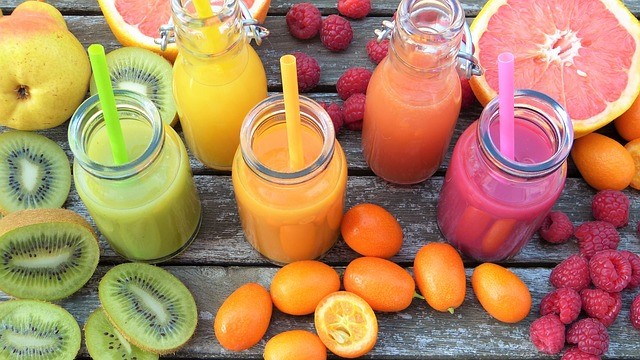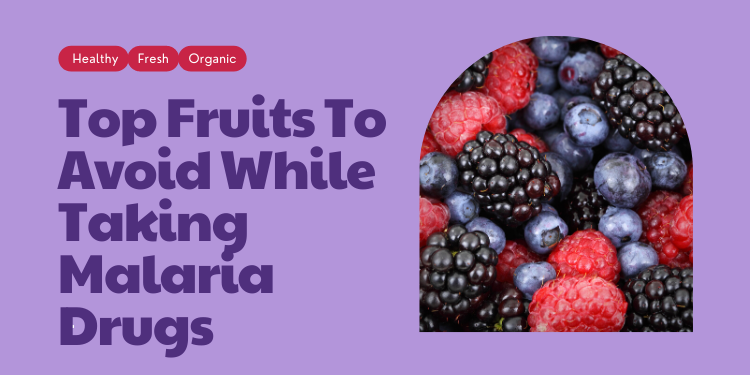Malaria is probably the most common ailment that Africans especially Nigerians suffer from.
Our weather and environment provide a suitable breeding ground for mosquitoes that transmit this malaria to humans.
If you're reading this post, you've probably treated malaria more than once in the last six (6)months. Sometimes you may end up taking the full dosage of treatments only for the symptoms to remain and you've been wondering if the drug you bought is fake.
But what if I told you that you are the reason why your antimalarial drugs have not been working effectively?
How?
The fruits you take always of course.
It is common for malaria patients to lose their appetite, making it difficult to consume solid food, so they turn to fruits and juices instead.
And you might see no harm in it because, after all, fruits are supposed to contain the nutrients your body needs to heal itself.
That is partially true. Taking fruits is beneficial nutritionally but certain fruits do not combine well with antimalarial drugs. These fruits are what we'll be identifying and talking about in today's post.
Here's a breakdown of what we'll be discussing in this article:
- What is malaria?
- Common symptoms of malaria
- Treatment of malaria: examples of malaria drugs
- Top fruits to avoid while taking malaria drugs
- Foods you should eat while taking malaria drugs
What Is Malaria?
Malaria is a protozoal disease that weakens the immune system as a result of the antibiotics used to treat the disease. Malaria is transmitted through the bite of the female anopheles mosquito. Mosquitoes survive on blood that they feed off humans and in the process of feeding, the malaria parasite enters the bloodstream, affecting the red blood cells and weakening the victim's immune system.
Common Symptoms of Malaria
The most common and obvious symptom of malaria is high-grade fever. This is usually accompanied by chills, headaches, vomiting, diarrhea, muscle pain, back pain, fatigue, dry cough, and enlargement of the liver. Malaria symptoms usually clear up within three days of treatment but more severe cases can be fatal. In these severe cases of malaria, some other organs in the body may be affected resulting in severe blood loss, kidney failure, hypoglycemia, respiratory involvement, jaundice, loss of consciousness, cerebral malaria, and even death.
Treatment of Malaria: Examples of Malaria Drugs
There are lots of highly effective malaria drugs out there. These drugs usually come in pills and are to be taken morning, afternoon, and night for three days. Some examples of these malaria drugs are recommended by the World Health Organisation.
- Artemisinin-based Combination Therapy (ACT)
- Chloroquine
- Amodiaquine
- SP/Fansidar
- Quinine pills
- Artesunate rectal
- Quinine injection or intravenous (IV)
- Artesunate injection or intravenous (IV)
- Mefloquine
- Atovaquone
- Primaquine
- Doxycycline
The WHO has announced the release of the first malaria vaccine known as Mosquirix (RTS, S), this vaccine had been proven to be effective and it requires four injections for full protection against malaria. As of now, about one million vaccines have been administered to children in moderate to high transmission areas and they're currently working on making this vaccine readily available all over the world.
But since we don't have access to it yet, you can still prevent yourself and loved ones from getting infected and the first way to go about this is by avoiding mosquito bites. Now this will depend largely on your environment and the time of the year. Mosquitoes thrive in riverine and swampy areas and are more likely to breed during the rainy season. But since we can't change our environment, here are some tips you should try to keep yourself safe from malaria-transmitting mosquitoes.
- Use medicated nets in your bedroom when sleeping. These are usually free and distributed all through the year by most government hospitals and other health organizations affiliated with WHO here in Nigeria.
- Spray insecticides all over your rooms for at least one hour before you sleep.
- Rub mosquito repellant all over your body, or on exposed body parts while you're outside, especially in the evenings.
- Take your health seriously, get tested regularly, and make sure to take the full dosage of treatments, failure to do results in recurrent malaria sicknesses that are drug resistant.
Top Fruits To Avoid While Taking Malaria Drugs

While taking malaria drugs, also known as ACT drugs, it's important to avoid fruits rich in vitamin C because it nullifies the effects of the drug in your body. Antimalarial or ACT drugs work by creating a hostile environment for the malaria parasite, thereby killing it. But when you take fruits containing high amounts of vitamin C, you're essentially rendering the malaria treatment useless. It's like you're taking one step forward and two steps backward. Surprisingly many people do this and end up wondering why they never seem to get well.
If you are pregnant, you may want to avoid taking some of these fruits.
To help you avoid repeating such mistakes, we've picked out some of the top fruits you should avoid while taking malaria drugs.
- Orange: contains 51.1 milligrams of vitamin C
- Guava: contains 125.6 milligrams of vitamin C
- Pineapple: contains 432.6 milligrams of Vitamin C
- Mango: contains 122.3 milligrams of vitamin C
- Kiwi: contains 64mg of vitamin C.
- Papaya: contains 235mg of vitamin C
- Watermelon: Contains366mg of vitamin C
- Cantaloupe: contains298.7mg
- Lemon: contains 30.7mg of vitamin C
Other fruits, vegetables, and fruit juices that are rich in vitamin C include
- Strawberry
- Pink and white grapefruit juice
- Red Cabbage
- Brussels sprouts
- Broccoli
- Potato
- Kale
- Red and Yellow Bell Peppers
Also, avoid fruit juices especially for kids for the duration of the malaria treatment as most fruit juices contain ascorbic acid which is vitamin C.
In addition to the fruits we've just listed, you should also avoid the following foods so you don't upset your stomach. Since one of the symptoms of malaria is nausea and vomiting, eating these foods may result in indigestion, feelings of nausea, and vomiting. They include:
- Fatty foods like fries, chips, pastries, or anything that has much cheese in it.
- Caffeine (coffee or caffeinated drinks)
- High-fiber foods like leafy vegetables, and whole grain cereals.
- Hot and spicy foods.
Foods You Should Eat While Taking Malaria Drugs
Now having stated what you cannot eat, you still need to eat healthy and nutritious meals, to your immune system and give your body the strength it needs to heal faster. Here are some foods you should focus on eating while taking malaria drugs
- Carbohydrates: malaria comes with fever and this increases the body's metabolic rate BMR. This also increases the body's energy and nutrition requirements. To give meet up with your body's energy needs you need to consume a high-carbohydrate diet. Eat more rice in place of wheat and millet. Rice digests more easily and releases energy faster.
- Proteins: alongside carbohydrates, you also need to increase your protein intake, which will help to repair lost tissue. You can include food like eggs, chicken soup, and fish stew in your diet.
- Fluids: keeping yourself hydrated is important when you're down with malaria. You should be drinking at least 3 liters of water daily. If you find it hard to take that much water, you can substitute some parts with milk, yogurt, and other fruits like cucumber, coconut water, and sugarcane juice that have high water content and are loaded with nutrients.
- Nuts and Seeds: if you want to include phytonutrients in your diet. Consider adding dried nuts and seeds like peanuts, cashews, walnuts, and almonds. Aside from containing healthy fats and proteins, nuts and seeds also make great snacks. So if you can munch on them when you don't feel like eating large meals.
Summary
We understand that many people find it hard to eat. Some may feel nauseous and as a result end up eating as little as possible so they don't throw up, for others it could be a general loss of appetite. If you experience any of these while treating, it's totally fine. All you need to do is try an eat smaller meals throughout the day, take lots of fluid to stay hydrated, and avoid fruit juices and other fruits containing vitamin C while ensuring that you complete the full dose of your malaria treatment.
Don't forget to invest in quality sleeping nets, mosquito repellents, and insecticides. You can also take it a step further by taking a preventive dose of malaria drugs when traveling to mosquito-infested towns or villages.

